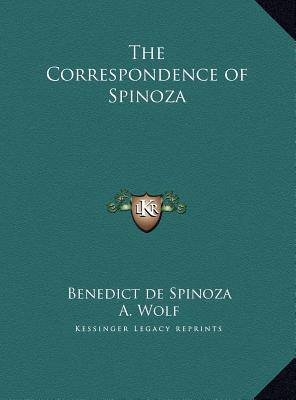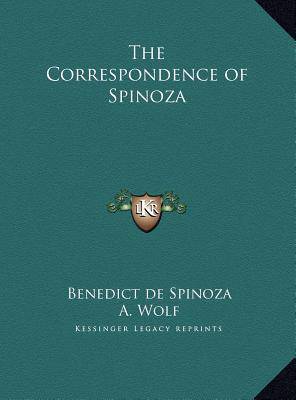
- Retrait gratuit dans votre magasin Club
- 7.000.000 titres dans notre catalogue
- Payer en toute sécurité
- Toujours un magasin près de chez vous
- Retrait gratuit dans votre magasin Club
- 7.000.0000 titres dans notre catalogue
- Payer en toute sécurité
- Toujours un magasin près de chez vous
77,45 €
+ 154 points
Description
The Correspondence of Spinoza is a collection of letters written by the famous Dutch philosopher Baruch Spinoza, also known as Benedict de Spinoza. The book offers a glimpse into the personal and philosophical life of Spinoza, who was a highly influential thinker of the 17th century.The letters cover a wide range of topics, including religion, politics, ethics, and metaphysics. They are addressed to various individuals, including fellow philosophers, theologians, and friends. Some of the most notable correspondents include Henry Oldenburg, a prominent member of the Royal Society, and Lodewijk Meyer, a fellow philosopher and friend of Spinoza.Throughout the letters, Spinoza discusses his views on God, nature, and the human condition. He also addresses the controversies surrounding his work, including his rejection of traditional religious beliefs and his advocacy for rationalism and freedom of thought.The Correspondence of Spinoza is a valuable resource for anyone interested in the history of philosophy or the life and work of one of its most important figures. It offers a unique perspective on Spinoza's ideas and personality, and sheds light on the intellectual and cultural context in which he lived and worked.1927. The letters of the great philosopher and theologian Spinoza, translated and edited with introduction and annotations by A. Wolf. Goethe says, �������His correspondence is the most interesting book one can read in the world of uprightness and humanity.������� It presents a pageant of the leading types of 17th century mentality. It affords contemporary glimpses of important scientific researches and discoveries. The letters contain things of first-rate importance for the correct interpretation of the philosophy of Spinoza, and, above all, they help one to realize something of the greatness and strength of his character - one of the greatest in the whole history of mankind.This scarce antiquarian book is a facsimile reprint of the old original and may contain some imperfections such as library marks and notations. Because we believe this work is culturally important, we have made it available as part of our commitment for protecting, preserving, and promoting the world's literature in affordable, high quality, modern editions, that are true to their original work.
Spécifications
Parties prenantes
- Auteur(s) :
- Editeur:
Contenu
- Nombre de pages :
- 510
- Langue:
- Anglais
Caractéristiques
- EAN:
- 9781169801479
- Date de parution :
- 10-09-10
- Format:
- Livre relié
- Format numérique:
- Genaaid
- Dimensions :
- 216 mm x 279 mm
- Poids :
- 1460 g

Les avis
Nous publions uniquement les avis qui respectent les conditions requises. Consultez nos conditions pour les avis.






